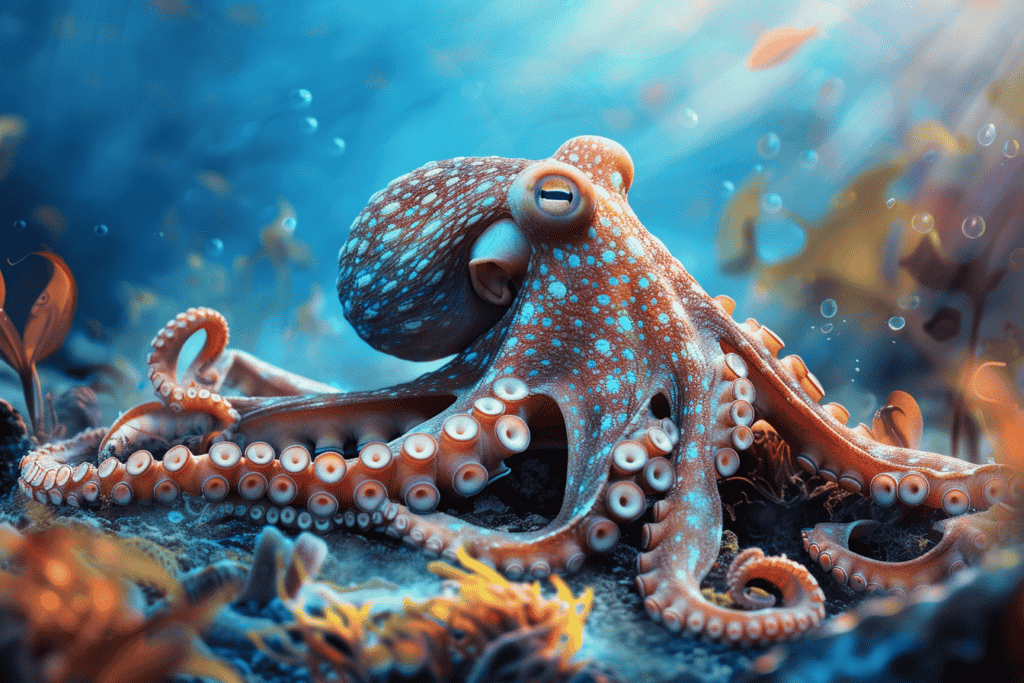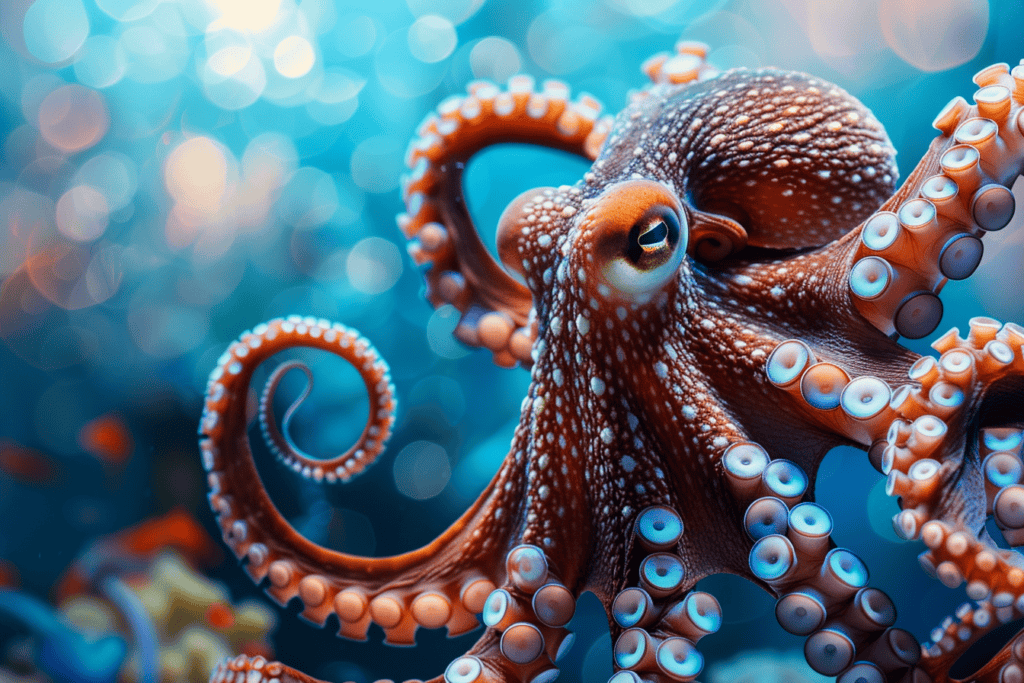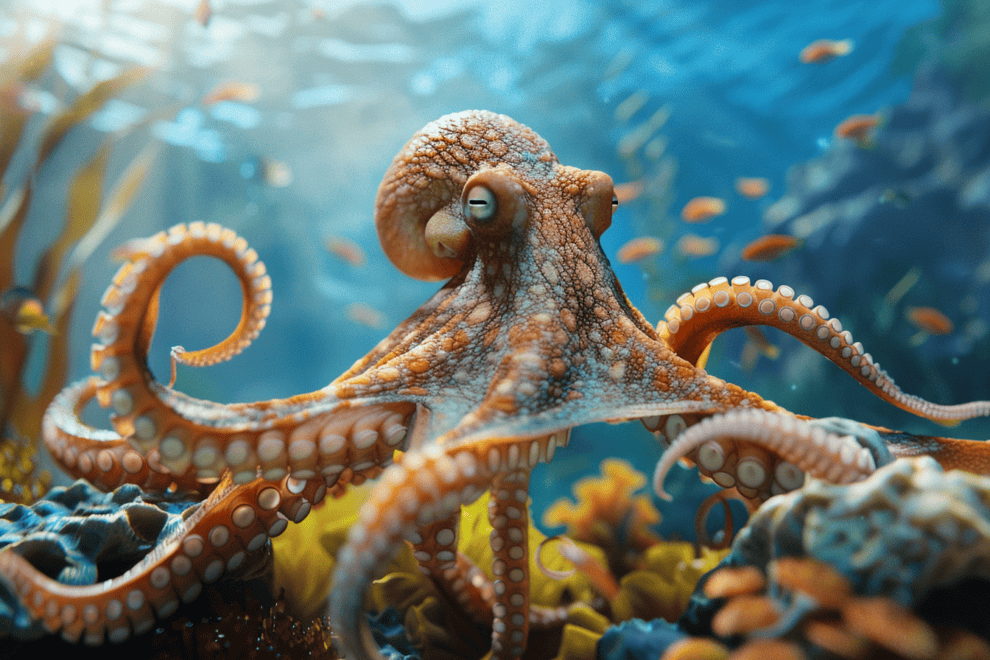Octopuses are cephalopods, a group of marine animals that includes squid and cuttlefish.
These creatures have complex nervous systems and are capable of learning and problem-solving. Octopuses, in particular, have been shown to have an astonishing level of intelligence.
They are able to use tools, solve puzzles, and even exhibit signs of playfulness.

Scientists have been studying the intelligence of octopuses for decades, and their findings have been nothing short of remarkable.
For example, octopuses have been observed escaping from tanks by unscrewing lids or squeezing through small openings. They have also been known to mimic other animals and even use coconut shells as shelters.
These behaviors suggest that octopuses are not only intelligent but also highly adaptable and creative.
The Mysterious Minds of Octopuses
Octopuses have a highly developed brain that is capable of complex processing and decision-making. Their brains are divided into three parts: the central brain, the optic lobes, and the vertical lobe.
Each part is responsible for different functions such as processing visual information, controlling movement, and regulating the body’s functions.
In addition to their brain, octopuses have a decentralized nervous system that is distributed throughout their entire body.
This means that their arms can act independently of their brain, allowing them to perform complex tasks such as opening jars and solving puzzles.
Learning and Memory
Octopuses have an incredible ability to learn and remember. They are capable of remembering complex mazes and solving puzzles that require multiple steps.
They can also learn from observation, which means that they can watch other octopuses solve problems and then apply that knowledge to their own problem-solving.
Studies have shown that octopuses have both short-term and long-term memory. They are capable of remembering information for several hours or even days, which allows them to solve problems that require memory recall.
Problem-Solving Prowess
Octopuses are also known for their incredible problem-solving skills.
They have been observed using tools, such as coconut shells, to create shelter and protect themselves from predators. They can also open jars and containers to access food, and they can solve complex puzzles that require multiple steps.
Their problem-solving skills are a result of their incredible intelligence and their ability to learn and remember.
They are capable of adapting to new situations and finding creative solutions to problems, which has allowed them to survive in a variety of environments.
Masters of Camouflage and Escape

Octopuses are known for their incredible ability to camouflage themselves in their environment. This is known as the art of disguise.
The octopus can change its color and texture to blend in with its surroundings, making it almost invisible to predators.
They have specialized skin cells called chromatophores which allow them to change color in an instant.
The octopus is also a master of escape. They are highly adaptable and flexible creatures, able to slip through the tiniest of spaces.
They have been known to escape from seemingly secure confinement, making them the escape artists of the sea.
Art of Disguise
Octopuses use their camouflage abilities to protect themselves from predators and to stalk their prey.
They are able to create varied patterns and undulating displays to blend in with their surroundings. They can change their skin color and pattern at the blink of an eye, making them almost invisible to predators.
The common octopus, for instance, is considered medium-large compared to other octopus species. They can range from 1-3 ft in length, including their arm span. Common octopuses have eight arms, which are used for feeling and tasting.
Hundreds of suction disks are located on the underside of common octopus arms.
The octopus’s boneless body provides them with an astonishing level of flexibility. They can squeeze through tiny openings and escape from seemingly secure confinement.
The octopus’s ability to escape from predators is what makes them one of the most adaptable creatures in the ocean.
Fun fact: Octopuses have three hearts and blue blood!
Social and Playful Tentacles

Octopuses are not only intelligent but also social and playful creatures. They exhibit a range of behaviors that suggest they are capable of complex social interactions with other octopuses and even with other species.
Octopuses are known to play with objects in their environment, including rocks, shells, and even each other. They have been observed juggling objects with their arms and tossing them back and forth between each other.
This playful behavior is not only entertaining to watch but also serves a purpose in their development and survival.
Octopuses also exhibit a range of other behaviors that suggest they are capable of complex social interactions.
They have been observed displaying aggression towards other octopuses, as well as engaging in courtship rituals and mating behaviors. In some species, males will guard their mates and protect them from other males.
Interactions with Other Species
Octopuses are not only social with their own kind but also with other species.
For example, some octopuses have been observed interacting with divers, playing with their equipment and even tugging on their fins.
This behavior suggests that octopuses are capable of recognizing and interacting with other intelligent creatures, even those outside their own species.
In addition to playful interactions, octopuses have also been observed using their arms to defend themselves against potential predators.
They can wrap their arms around their bodies to protect themselves or use their arms to lash out and strike at an attacker.
Octopuses and Human Understanding

Octopuses have been the subject of philosophical inquiry for centuries. They challenge our understanding of consciousness and the nature of intelligence.
Peter Godfrey-Smith, a philosopher of science, has explored the philosophical implications of the octopus mind in his book, “Other Minds: The Octopus, the Sea, and the Deep Origins of Consciousness.”
Godfrey-Smith argues that the octopus mind is so different from our own that it forces us to rethink our assumptions about consciousness.
He suggests that the octopus mind is not only different but also complex and sentient. This means that octopuses are capable of experiencing emotions and pain, just like humans.
The study of octopuses also raises important ethical and animal welfare considerations.
As we learn more about the intelligence and sentience of octopuses, we must consider how we treat them.
The octopus is an important part of marine ecosystems, and their conservation is essential for the health of the oceans.
There is growing concern about the welfare of octopuses used in research and aquaculture.
Some researchers argue that octopuses should be given more protection because of their advanced intelligence and emotional capacity. Others argue that we should not use octopuses in research at all.
Frequently Asked Questions

How do octopuses demonstrate their problem-solving abilities?
Octopuses are known for their remarkable problem-solving abilities.
They have been observed using tools, such as coconut shells, to build shelters and protect themselves from predators.
Octopuses also have the ability to open jars and solve puzzles to obtain food.
These intelligent creatures have been known to use their problem-solving skills to escape from aquariums and other enclosures, making them a fascinating subject of study for marine biologists.
Can octopuses feel emotions, and how might this affect their behavior?
While it is difficult to know for sure, some researchers believe that octopuses are capable of experiencing emotions.
Studies have shown that octopuses have a complex nervous system that allows them to respond to stimuli in a way that suggests they may be capable of feeling pain and other emotions.
This may affect their behavior, as they have been observed exhibiting curiosity, playfulness, and even aggression in response to certain stimuli.
What are some of the most remarkable escape stories involving octopuses?
Octopuses are well-known for their ability to escape from aquariums and other enclosures.
In one particularly remarkable story, an octopus at the Santa Monica Pier Aquarium in California managed to escape from its tank and make its way to the ocean through a series of pipes.
In another instance, an octopus at the National Aquarium of New Zealand broke out of its tank and made its way to the ocean by squeezing through a small gap in the aquarium’s drain system.
These stories highlight the incredible problem-solving abilities and intelligence of octopuses.
How does the lifespan of an octopus influence its learning and memory?
Octopuses have relatively short lifespans, with most species living for only a few years. However, during this time, they are capable of learning and remembering a great deal.
Studies have shown that octopuses have excellent short-term memory and are able to learn from experience. This may be due in part to their highly developed nervous system, which allows them to process and retain information quickly.
In what ways are the intelligence levels of octopuses and humans similar or different?
While octopuses and humans are very different creatures, they do share some similarities when it comes to intelligence.
Both species are capable of problem-solving, learning, and memory. However, humans have a much more advanced brain and are capable of more complex forms of reasoning and communication.
Octopuses, on the other hand, have a highly developed nervous system that allows them to process information quickly and respond to stimuli in a way that is often surprising and fascinating to researchers.
What unique abilities do octopuses possess that showcase their intelligence?
Octopuses possess a number of unique abilities that showcase their intelligence. For example, they are able to change color and texture to blend in with their surroundings. This allows them to avoid predators and hunt more effectively.
They also have the ability to regenerate limbs, which is a rare and impressive feat. Additionally, octopuses have a complex nervous system that allows them to process and respond to stimuli in a way that often surprises and fascinates researchers.


